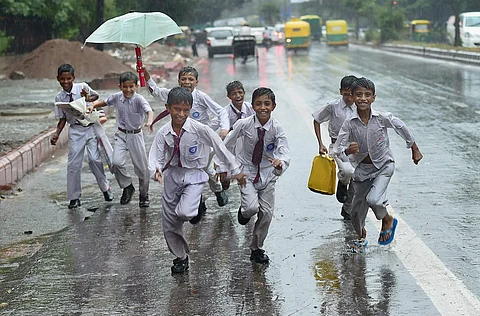

The Delhi Commission For Protection of Child Rights’ (DCPCR) early warning system has supported over 33,000 students chronically absent from schools to resume their formal education, a statement said. The early warning system — a collaboration between the Directorate of Education (DoE), the Delhi government and the DCPCR — aims to protect the 'at-risk' children and bring them back to school, as stated in a report by PTI.
Idea behind the system
It fundamentally operates on the idea that a substantially low school attendance of a student is the ramification of a circumstantial vulnerability threatening the child's education and well-being, the statement said. Launched in April 2022, the system is currently deployed across all 1,046 Delhi government schools, comprising nearly 19 lakh students. It has resulted in outreach to more than 73,000 chronically absent students and has supported over 33,000 children to return to school and resume their formal education, the statement said, as per PTI.
Reasons for absenteeism
Major reasons for absenteeism include sickness (41 per cent), permanent and temporary migration to different states (25 per cent) and students' families unaware of or denied absenteeism (11 per cent). Further, some of the critical cases identified also included death of a parent (nearly 200 cases), bullying (nearly 100 cases), child labour (nearly 150 cases) and child marriage.
Nearly 6,841 children, mainly adolescent boys, were found bunking school as parents denied their absence from the schools while attendance records reflected them as chronically absent. Additionally, typically children belonging to socio-economically weaker sections attend government schools, and hence, by extension, they are highly vulnerable to life-threatening dangers, exploitation by strangers and compromised well-being, the statement said. This leads to high absenteeism in schools which is a pan India problem.
Most of them now attend school regularly because of DCPCR intervention, it said. Commenting on the initiative, DCPCR chairperson Anurag Kundu said, “DCPCR works singularly to promote and uphold child rights in Delhi. Because of the early warning system, Delhi's student attendance tracking and intervention system has become much better than that of the UK where chronic absenteeism is also nearly 20 per cent and no such tracking system exists."
The project leverages the Education Department's online attendance marking system to detect students who are at risk of dropping-out and launches a series of preventive and remedial interventions to support children's well-being and assist them in resuming their education. These interventions include nudges to the parents by means of SMS/IVR and helpline calls. Several studies prove that nudges can be remarkably helpful in changing citizens' behaviours, the statement said.
The DCPCR helpline establishes contact with these families to understand the reasons behind their children's absenteeism, provide them the support they need and also counsel them on the importance of children attending school regularly. All high-risk cases such as abuse, trafficking, child marriage, child labour, medical emergencies cases are automatically transferred to DCPCR's grievance management teams for resolution of issues and then to relevant department or authorities for their resolution. SOS cases are attended to within 24 hours of receiving the grievance, the statement added.
